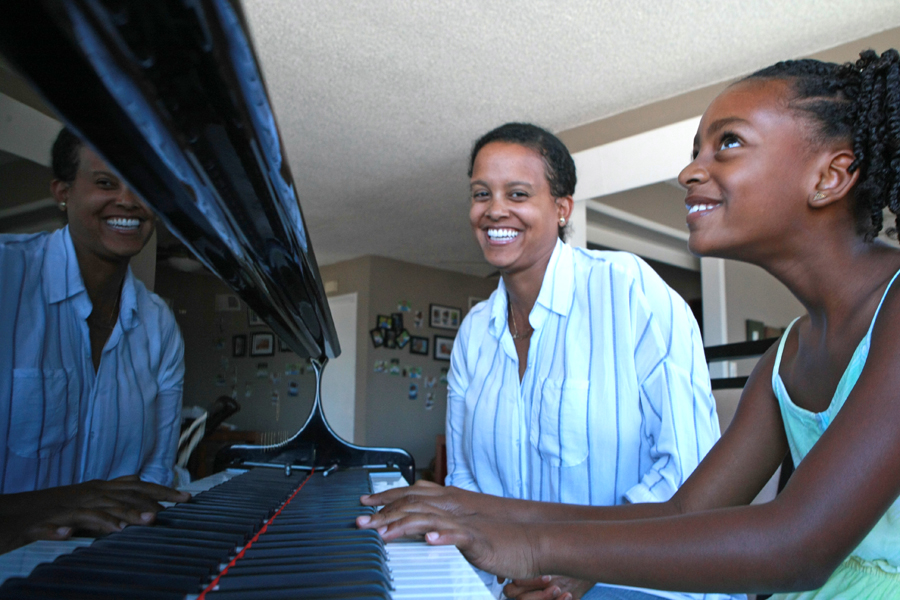By Blake Carter
There are many benefits to playing an instrument, and the piano is the most popular to learn. There is a strong link between playing the piano and other skills that lead to success in other aspects of life.
Sara Araya, a local piano instructor, teaches people of all ages out of her Baldwin Hills home, and she says that both children and adults benefit from learning how to play in various ways.
“For children, playing the piano stimulates various neurotransmitters (or chemical messengers) in the brain, opening up new pathways to learning,” she said. “Ive seen it positively affect kids in school. Their math scores will go up because they are understanding that music is math. A lot of key concepts needed to learn an instrument are similar to problem solving skills in typical algebra. Time signatures are similar to compound fractions. There is a lot of math involved in learning how to count beats and keeping time with both hands. Students connect the skills they are learning in music to what they’re doing in school.”
Piano can also help young students with their comprehension skills.
“You have to really understand what you’re doing, because you’re not doing one singular thing,” Araya said. “You’re doing all of these different little things that you have to put together to make one sound. You have to put together your fingers, you have to know how to read notes, and timing. If you involve a pedal with your foot, your foot has to press that pedal at the right time.”
Learning how to play an instrument can also help children who have issues focusing on a task, such as with attention deficit hyperactivity disorder (ADHD).
“I’ve taught kids with ADHD,” Araya said. “They get so focused in the music. These sounds and harmonies and melodies that they’re producing helps them focus. When you have a piece of music in front of you, you’re forced to stay in that lane. You can’t go outside that box. It’s almost like they have to have tunnel vision with music.”
Some children can lose faith in their abilities as they grow up, but learning an instrument can build their confidence.
“Learning to play the piano helped me build my confidence,” Araya said. “For my students, when they do recitals especially, they get to showcase what they’ve been working on and how far they’ve come. With lessons, some of my students can’t wait to come to show me what they were able to accomplish that week, or the mountain that they were able to climb. It’s a confidence booster when you can overcome a really difficult part, or understand something in music theory.”
For adults, the benefits can be different.
“They’ve gone through their whole life, and they’ve learned all these things, and they’ve traveled the world,” Araya said. “But when it comes to music, they’re like, ‘oh, I don’t know anything.’ It’s like learning to walk again, or learning a new language.”
For many adults they are continuing something that they started as a child but moved away from as they focused on higher education and their careers. And for a lot of adults, they play an instrument, such as the piano, as a stress reliever.
“They want to pick it back up because it can help with anything from stress levels to anxiety,” Araya said. “Music is a healing mechanism. It heals all different things. It gives a person not only a place to zone out to, but also a place to zone in to.”
While the piano is a relatively large and expensive instrument, that is not much of a hurdle for people who are really committed to learning how to play, according to Araya. She said that the piano is a major investment, and space can also be an issue, but many of her students find their way around that by practicing on an electronic keyboard, which can easily be stored and is inexpensive when compared to a piano. Some of her students have an app on their iPad or tablet that has a keyboard.
Another hurdle that young students can have is balancing their piano lessons with all of their other extracurricular activities, but Araya said that it is not much of an issue.
“I don’t think that I have one student who just does the piano,” she said. “I think that all of my students over the years have been involved in so many extracurricular activities. Even when I was a young student, piano was just one of the things that I did. It ended up being the lasting thing, because everything else fell away. But many of my students do ice skating, ballet, dance, basketball, and soccer.”
It is a good idea for parents to make time for their children to learn an instrument. For Mo McRae, he has personally seen the positive benefits that his daughter Miami has received from taking lessons with Araya.
“Sara has been an incredible teacher,” he said. “She has found a way to help Miami focus and complete lessons without losing any of the fun that kids need to stay engaged. In a fairly short amount of time, Miami has grown as a budding musician. The skills that she has acquired to play the piano have boosted her confidence in other areas outside of music as well.”
To contact Araya, email her at This email address is being protected from spambots. You need JavaScript enabled to view it. or call 323-702-4191.









